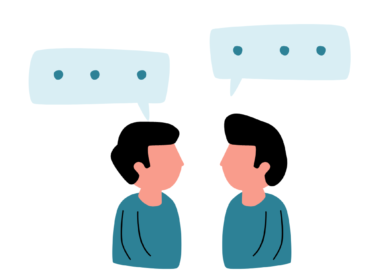Breaking the Stigma: Promoting Mental Health Awareness in Immigrant Communities
By Bryn Durocher

If you have read the past articles on this page, you might already know the word “stigma.” It is a negative stereotype (CMHA, 2023): a poor view of something according to common beliefs that are not often true. Negative stereotypes can target race, ethnicity, culture, age, and gender. For gender, you might have heard the stereotypes that girls are “weak” or “bossy,” which are neither accurate nor helpful, correct? Mental health stigma is the same way, neither truthful nor beneficial.
Mental health stigma affects patients through public stigma, self-stigma (from within), depressive symptoms, poor self-esteem, life satisfaction, and relationships (Bracke et al., 2019). Some cultural mental health stigma examples include thinking that mental challenges are shameful or crazy, even though we all experience them: for some Asian Americans, the way mental illness reduces your ability to care for others makes it shameful to them (McLean Hospital, 2023). In reality, stigma hurts the person struggling and wrongly blames them for something out of their control. It creates a less accepting, loving, and understanding society about something prevalent.
Quotes on mental health stigma include one by Thornicroft (2017), where he states: “There is no known country, society or culture where people with mental illness (diagnosed or recognized as such by the community) are considered to have the same value or be as acceptable as persons who do not have mental illness.” This is a disheartening statement about society and stigma. Dr. Theresa Tam, Chief Public Health Officer of Canada, says (2019): “Stigma is persistent in our health system. It creates barriers to equitable service and effective care for those in need. We must address, reduce and ultimately eliminate stigma to provide a safe, effective, and compassionate health system that puts people first. Together, we can create the most inclusive health system in the world”. Cultural stigma creates barriers to healthcare by shaming or guilting people out of necessary mental health resources (Canada, 2019). Discontinuation of treatment and poorer treatment are also associated with stigma (Knaak et al., 2017).
Let’s look at men’s mental health stigma; it is also often discussed. For centuries, men have been encouraged to be strong. The unrealistic expectations and stereotypes towards men have led to their mental health challenges being seen as a “weakness” by others (Marcello, 2022, June 16). In many cultures, a taboo is associated with men’s mental health, especially in cultures where they are given important, strong roles (Gough, 2020). Generally, men are less likely to tend to their mental health, maybe because they are seen as less “manly” for speaking about their feelings (Marcello, 2022, June 16). As one can imagine, depression and anxiety are men’s most frequent mental disorders. Humber River Hospital suggests that men take the first step in admitting they need help and practice coping through exercise and activities such as yoga and chi. There are even clinicians today that specialize in men’s mental health.*
*If you are in Canada and wish to find clinicians with specializations such as men’s issues or otherwise (trauma, self-harm, depression, and anxiety), try searching for mental health professionals at bookmytherapy.ca or Psychologytoday.com’s therapist finder.
As Dr. Theresa Tam said, we need to break the stigma. Within cultural communities, there are many ways to end the stigma.

1. Educate yourself and those around you about mental health (CAMH, 2023). It would be best if you educated yourself before you can educate others. Even speaking to just one person about mental health could be beneficial.

2. Be optimistic about mental health (CAMH, 2023). Mental health challenges are only one part of a person. There is still so much good to be seen in others. Furthermore, realizing that mental health problems are common and normal and treating them as such allows us to open the conversation and make it more comfortable for those struggling to speak out.

3. Support others (CAMH, 2023). Be respectful and encouraging when others share their feelings with you; let them know that what they feel is valid because it is accurate. Show empathy like you would to any other problem.

4. Encourage equality of mental and physical illness (American et al., 2020). Creating a comparison between the two types of health allows you and others to see mental disorders, such as we see physical illnesses, and normalize them.
There is no one way to promote mental health awareness. It can be done nationally by promoting support, building policies, and bettering healthcare (WHO, 2004). The World Health Organization (2004) suggests that more considerable mental health promotion includes research, a plan, gathering resources, taking action, and monitoring action and change. Promotion can also be done individually, as we have discussed in our list.
Your choice of promotion may involve telling a friend about mental health. Consider suggesting a self-care method to a family member, such as walking. Alternatively, it may be more intense (think of physical health campaigns). It is helpful to promote mental health awareness in big or small ways.
Schools are also becoming more involved in the education process of mental health awareness. Ontario (2023) states that it is a priority for educators to promote health and well-being. Having an accepting learning environment at school or home can reduce stigma within the culture. Childhood is a vulnerable period; many lessons we teach young people will last into their future.
The Framework Stepping Stones (2012) introduces aspects of a person, including cognitive, emotional, physical, and social parts. These aspects are connected, and Ontario (2023) further explains that mental health affects all these domains. For example, cognitive functioning can be impaired. Emotional effects include depression, physical aspects include physical symptoms such as nausea, and we already know that mental health challenges impair social functioning. This is why reducing the mental health stigma for children is essential so that we can acknowledge struggles and “set students up for success” (Ontario, 2023). Many students struggle with mental health problems, so education on how to cope is vital.
Breaking the mental health stigma can not happen all at once. It takes time and effort. Breaking the stigma within yourself is the first step and will benefit your health. You will be kinder to yourself, more understanding, and more willing to use the healthcare resources around you. Others will follow your example. So please do not feel discouraged about stigma; see it as an opportunity to change yourself and the world.
Sources
Borenstein, J. (2020). Stigma, prejudice, and discrimination against people with mental illness. Psychiatry.org. https://tinyurl.com/ynbjddcs
Bracke, P., Delaruelle, K., & Verhaeghe, M. (2019). Dominant Cultural and Personal Stigma Beliefs and the Utilization of Mental Health Services: A Cross-National Comparison. Frontiers in sociology, 4, 40. https://doi.org/10.3389/fsoc.2019.00040
CMHA. (2023). Stigma and Discrimination. CMHA Ontario. https://tinyurl.com/yjrnya9z
Gough B, Novikova I. (2020) Mental health, men and culture: how do sociocultural constructions of masculinities relate to men’s mental health help-seeking behavior in the WHO European Region? Health Evidence Network Synthesis Report, No. 70. 2. https://www.ncbi.nlm.nih.gov/books/NBK559709/
Knaak, S., Mantler, E., & Szeto, A. (2017). Mental illness-related stigma in healthcare: Barriers to access and care and evidence-based solutions. Healthcare management forum, 30(2), 111–116. https://doi.org/10.1177/0840470416679413
Koschorke, Evans-Lacko, S., Sartorius, N., & Thornicroft, G. (2016). Stigma in Different Cultures. In The Stigma of Mental Illness – End of the Story? (pp. 67–82). Springer International Publishing. https://doi.org/10.1007/978-3-319-27839-1_4
Marcello, C. (2022, June 16). Breaking the stigma: Men’s Mental Health. Humber River Hospital. https://tinyurl.com/5yf4demu
McLean Hospital. (2023, May 2). Why Asian Americans don’t seek help for mental illness. McLean Hospital. https://tinyurl.com/3vaxzs7w
Ontario. (2023). Considerations for Program Planning. Curriculum and Resources. https://tinyurl.com/3njastv4
Public Health Agency of Canada. (2019, December 18). Addressing stigma in Canada’s health system is critical for improving health outcomes. Canada.ca. https://tinyurl.com/4br582bc
World Health Organization. (2004). Promoting mental health. https://tinyurl.com/59da25h4
- Login
- Sign Up